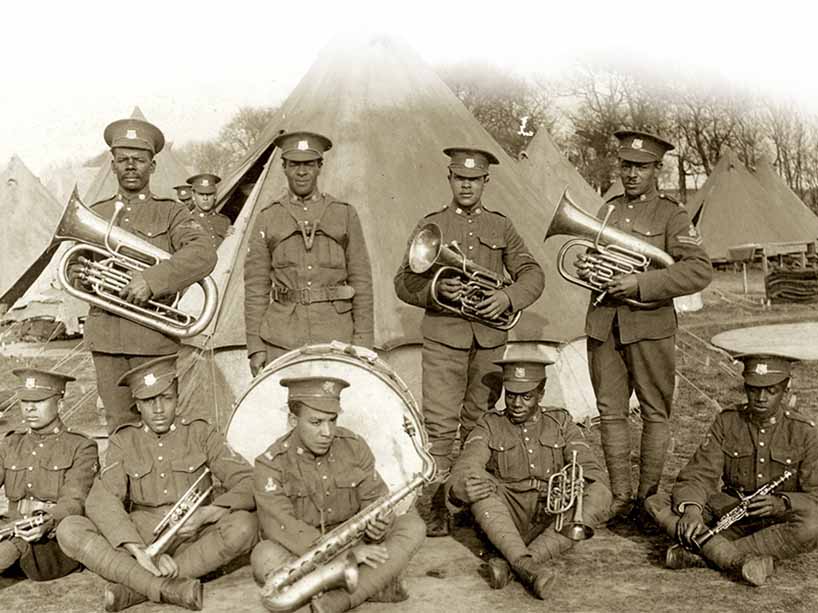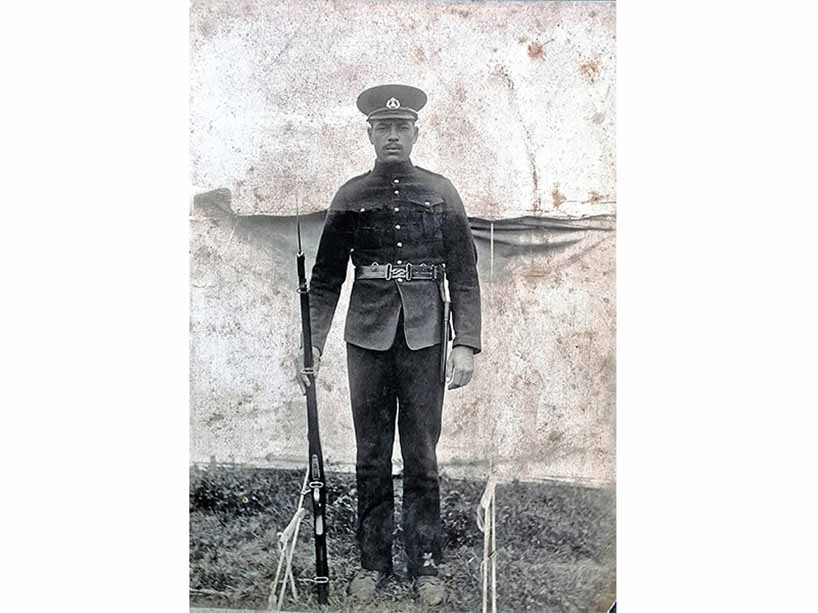Looking at the ongoing horrors of war

The No. 2 Construction Battalion, Canada’s first and only all-Black battalion, gave immeasurably of themselves in the First World War while experiencing dehumanizing racism. In July of 2022, Prime Minister Justin Trudeau issued an official apology on behalf of the Government of Canada to the descendants of these servicemen. Photo courtesy of Kathy Grant
In recent years, we've seen a shift away from commemorating Remembrance Day as an occasion for our nation's institutions to relay stories about the bravery of our servicemen and women, some of whom made the ultimate sacrifice, toward using the act of remembering to reflect on the horrors of war itself and how wars expose existing rifts in our societies, says Hyacinth Simpson, professor in the Department of English and principal investigator on the multi-tiered project Black Canada and the Great War.
The violence and traumas that come with waging war reverberate long after a ceasefire is reached, says Simpson; and later generations bear the traumas.
One example of such violence and trauma is the anti-Black racism experienced by the men who served during the First World War with the No. 2 Construction Battalion of the Canadian Expeditionary Force, Canada’s first and only all-Black battalion. On July 9 2022, Prime Minister Justin Trudeau issued an official apology to the family members of the servicemen for the racism these men endured while serving the country.
No. 2 Construction Battalion’s fight to fight
When Canada joined the war that had broken out in Europe, there were hundreds of Black men who wanted to serve, but nearly all were turned away. “In one instance, a group of 50 Black volunteers journeyed from Sydney to New Glasgow by train and waited all day at the recruiting office, only to be told that this was ‘a white man’s war,’” said Trudeau in his apology.
In 1916 – two years after the war had begun – the Government of Canada and the military authorities permitted Black men to form their own battalion: the No. 2 Construction Battalion. The battalion wasn’t comprised solely of Canadians; it also included Black men from the Caribbean and the United States who wanted to serve and found an opportunity to do so on behalf of Canada with the No. 2.
The No. 2 Construction Battalion was deployed to Europe as a labour unit, and was sent to the Jura Mountains in Southeast France to join the Canadian Forestry Corps. “They did grueling work and their contributions were invaluable to the war effort. The lumber they cut lined the trenches on the front lines, became railway ties and was even used in aircrafts,” said Trudeau. “Thanks to their faithful and disciplined work, the mills produced double the lumber of other comparable units.”
These servicemen, however, still had to sail on a separate ship and live in segregated camps without proper medical care, rations, or equipment.
Hyacinth Simpson appeared on CBC News to talk about the importance of the apology from Prime Minister Justin Trudeau.
Revisiting our stories about war
Simpson says there has been a growing body of work over the past couple of decades delving into Black contributions to the First World War, but there's still a lot of work to be done. She is one of these scholars who have been working to make more public the contributions made by Black servicemen.
Including these men’s stories, and the overt racism they experienced while serving, is important because “the stories we tell ourselves about war are also the stories about our nation, about who belongs and who contributed to building the nation,” says Simpson.
In his apology, Trudeau said the Canadian government wanted to accept responsibility for the mistakes of the past and pledged to work to build a better future. “To risk your life to defend your values, and your loved ones is an act of extraordinary bravery. Of honour. Of sacrifice. And of loyalty,” he said.
We are committed to meaningful change, where the dignity of all service members in the Canadian Armed Forces is upheld. Where everyone is welcome; where everyone can rise through the ranks; where everyone has opportunities to distinguish themselves. We cannot ever let what happened to No. 2 Construction Battalion happen again. And we cannot let the service of any member of our forces ever be overlooked and forgotten.
“The prime minister’s acknowledgment of the harm done to the Black men who fought to fight for Canada during the Great War and his willingness to name the problem for what it was – systemic racism and anti-Black hate – was a very welcome change from the tone and thrust of previous federal apologies and statements of regret,” says Simpson.
She adds, “The descendants of the Black servicemen in the No. 2 Construction Battalion and other Black Canadians noticed and appreciated his use of these words, especially as Black communities don't often hear such full-throated acknowledgement of the harm done to us.”

A serviceman from the No. 2 Construction Battalion. Photo provided by the Niagara Military Museum
Simpson notes that Trudeau also said that Canada is committed to meaningful change, “where the dignity of all service members in the Canadian Armed Forces is upheld. Where everyone is welcome; where everyone can rise through the ranks; where everyone has opportunities to distinguish themselves.”
Those words stood out for her: “The prime minister was linking the anti-Black racism in the Canadian Expeditionary Force from over a century ago to anti-Black racism in the Canadian Armed Forces now. It signalled an understanding that the sanctioned acts of violence against serving men because of their colour back then are perpetuated in acts of structural and systemic violence against Black personnel currently serving, and against Black people in other Canadian institutions and spaces as well.”
She says that perhaps Trudeau’s words have the potential to help ignite a more public conversation about the violence of anti-Black hate in Canada.
Looking ahead
“Beyond the much-needed and much-appreciated public acknowledgement of the harmful effects of anti-Black racism on Black people who have been contributing to building Canada, there has to be meaningful systemic change and reparative action for the apology to be substantive,” says Simpson. She says she’s heard many Black community members express similar sentiments.
“I would like to see post-apology actions that name specific forms of anti-Black racism, respond appropriately to the marginalization and misrepresentation of Black people, and create safe spaces and opportunities for affected Black individuals and communities. One suggestion that has been put forward is the creation of opportunities for Black and underrepresented people in the Canadian Armed Forces. This is on the list of post-apology recommendations prepared by The National Apology Advisory Committee [the committee that organized the apology event and related activities] in consultation with descendants of the men of the No. 2 Construction Battalion, and other Black Canadians.”
This Remembrance Day, the TMU community can reflect on the immediate and resulting horrors of war with Professor Simpson at the TMU Remembrance Day Ceremony taking place in Quad at 10:45 a.m. Brian Outinen, Chief Anishinaabemowin translator for Canada and veteran, will also be a guest speaker. Anver Salojee, interim vice-president, Equity and Community Inclusion, will be the event's MC.
Related stories:
